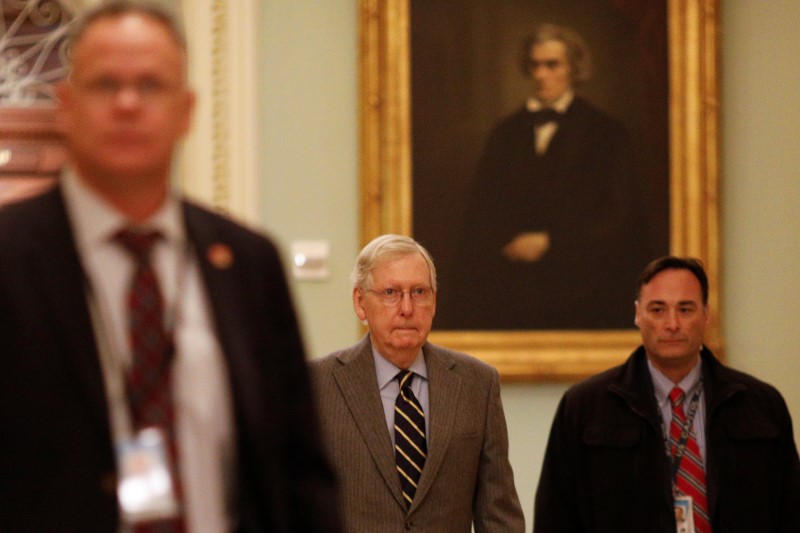By Jan Wolfe
(Reuters) - U.S. Senate Majority Leader Mitch McConnell has said he has enough support from his fellow Republicans to begin the impeachment trial of President Donald Trump even though lawmakers have yet to agree whether to call witnesses.
The framework supported by Republican senators, which McConnell has described as a "phase one" deal, would postpone the decision on whether to have witnesses testify during the trial — mirroring the process used during former Democratic President Bill Clinton's five-week impeachment trial in 1999.
The Democratic-controlled House impeached Trump in December on charges he pressured Ukraine to investigate former Vice President Joe Biden, a leading candidate for the 2020 Democratic presidential nomination.
The following explains what the Republican-supported resolution on trial rules is expected to look like.
What will be covered by the Republican-backed "phase one" plan?
McConnell has not yet published a draft of the resolution but he said it would be "very similar" to one adopted in January 1999 during the Clinton trial.
That resolution set deadlines for the prosecution and defense to submit "trial briefs" that laid out their cases in writing. The resolution also allocated 24 hours for representatives of each side to make oral arguments and set aside 16 hours for senators to ask them questions.
It allowed senators to seek dismissal of the charges against Clinton in the middle of the trial, which would have effectively ended the process. A senator sympathetic to Clinton filed such a motion, but it was voted down.
Crucially, the resolution, which passed 100-0, did not resolve whether witnesses would be called — one of the most contentious questions in any impeachment trial. A follow-up resolution allowing for three witnesses to testify in videotaped depositions passed 2-1/2 weeks later along a party-line vote, backed by 54 Republicans and opposed by 44 Democrats.
The type of resolution described by McConnell would supplement, rather than replace, a set of detailed impeachment trial rules dating back to 1868 known as the "standing rules," said Donald Wolfensberger, a congressional scholar in Washington.
The "standing rules" specify speeches different individuals must recite and the times of day when events must occur, among other items.
How many votes does McConnell need for his "phase one" plan?
The answer to this question depends on whether U.S. House Speaker Nancy Pelosi transmits the articles of impeachment against Trump to the Senate, said Wolfensberger.
Once that happens, the Senate can open the trial and only a simple majority of senators would be needed to decide on the sort of initial rules McConnell has described, Wolfensberger said.
That vote would not occur until after Pelosi sends over the impeachment package, McConnell has said. Pelosi has held onto the papers in hopes of pressuring the Republican-controlled Senate into agreeing to hear testimony during the trial.
Frustrated with Pelosi's delay, Republican Senator Josh Hawley on Jan. 5 introduced a resolution that would allow the Senate to dismiss the impeachment articles before the House transmits them. It would require the support of two-thirds of the Senate to pass, making that outcome unlikely.
Could there still be witnesses in the Senate trial?
It is possible congressional Democrats will succeed in their push to hear from witnesses during the trial.
The Senate now has 53 Republicans, 45 Democrats and two independents who usually vote with the Democrats. That means four Republicans would need to cross party lines and join Democrats in requesting witness testimony.
Trump's former national security adviser John Bolton said on Jan. 5 he would testify before the Senate if issued a subpoena, a surprise development that could potentially strengthen the case that Trump should be removed from office.
U.S. Senate Democratic Leader Chuck Schumer now is pressuring Republican lawmakers to vote to allow witnesses and documents. Democrats hope to hear from Bolton and three current White House officials, including acting chief of staff Mick Mulvaney. Republicans could conceivably try to call witnesses of their own, like Biden or the government whistleblower whose complaint ultimately led to the impeachment inquiry.
Trump is unlikely to be removed from office, however, because under the U.S. Constitution that would require the support of two-thirds of the Senate.
